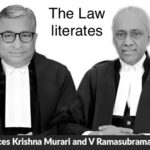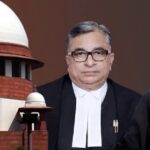Sections 498A, 406 and 34 IPC Anticipatory bail Mentally and physically harassment Husband stated that since wife is not capable of sexual intercourse, he cannot continue this relation Husband
PRASHANT GUPTA vs STATE OF NCT
BAIL APPLN. 911/2019 & CRL.M.(BAIL) 657/2019& CRL.M.A. 34196/2019 & 40070/2019
CORAM:
HON’BLE MR. JUSTICE SURESH KUMAR KAIT [ DELHI HIGH COURT ]
• Sections 498A, 406 and 34 IPC Anticipatory bail Mentally and physically harassment Husband stated that since wife is not capable of sexual intercourse, he cannot continue this relation Husband is personally present in court and has admitted that during stay of 24 days, they had sexual relations If the petitioner is admitting that they had sexual intercourse during aforesaid period, then this court cannot believe that the Husband and wife did not have sexual relations at least after marriage Thus, he has bluffed and misled this court by making a wrong allegations against wife Court has granted anticipatory and regular bail but keeping in view the conduct of the husband Not inclined to grant anticipatory bail to the petitioner Moreover, dowry articles are yet to be recovered from petitioner Petition dismissed.
for read the judgment click here :
Prashant gupta vs STATE OF NCT OF DELHI & ANR delhi high court
all rights reserved (Vaibhav Tomar 𝔸𝕕𝕧)
Sections 439 and 389 – Bail – While granting bail/suspension of sentence, excessive conditions cannot be imposed – Conditions for bail cannot become so onerous that their tantamount amounts to bail denial
(2023) 1 ApexCourtJudgments(SC) 58 : (2023) 1 CriCC 26 : (2023) 1 KHC 418 : (2023) 1 MadWN(Cri) 337 : (2023) 1 RCR(Criminal) 762
GUDDAN @ROOP NARAYAN Vs. STATE OF RAJASTHAN — Respondent
Criminal Appeal No. 120 of 2023 (@ SLP (Criminal) No. 9756 of 2022)
DATE OF DECISION:- 03-01-2023
Criminal Procedure Code, 1973 (CrPC) – Sections 439 and 389 – Bail – While granting bail/suspension of sentence, excessive conditions cannot be imposed – Conditions for bail cannot become so onerous that their tantamount amounts to bail denial – This Court, time and time again has held that jail is the exception and grant of bail is the rule, and in such a scenario, the conditions imposed on bail must not be unreasonable*_
ORDER
1. The present Appeal has been filed by the Appellant herein against the impugned order dated 20.09.2022 passed by the High Court Of Rajasthan in S.B. CA No. 360/2019. The Appellant herein is seeking for a waiver of the conditions imposed on the grant of suspension of sentence by the impugned order*_
_*2. We had already on 03.01.2023 passed an order allowing the Appeal and waiving off the conditions of bail. We are now giving reasons for the same*_
_*3. Briefly, the facts relevant for the purpose of this Appeal are as follows*_
_*3.1. It is alleged that the complainant, on the date of the incident, was assaulted on the head with an iron rod by the Appellant, causing the complainant to be admitted to the hospital*_
_*3.2. The complainant then registered an FIR against the Appellant u/s 341 & 323 of the IPC. A chargesheet was subsequently filed against the Appellant u/s 341,323,325 and 307 IPC*_
_*4. The Ld. Trial Court, vide order dated 20.02.2019 convicted the appellant u/s 307,323 and 341 of the IPC on grounds of the recoveries made, the eyewitnesses to the incident and the medical evidence. The Appellant was thus sentenced to 10 years Imprisonment and fine of Rs.1,00,000- with default sentence u/s 307 along with 1 year Imprisonment and fine of Rs. 1,000- with default sentence u/s 323 and a 1 month Imprisonment and a fine of Rs. 500/- u/s 341 of the IPC*_
5. The Appellant then preferred an Appeal before the High Court, and during the pendency of the Appeal preferred an Application for Suspension of Sentence.
6. The High Court, vide impugned order dated 20.09.2022 suspended the sentence of the Appellant, however imposed strict conditions of deposit of fine amount of Rs. 1,00,000/- along with a surety of Rs. 1,00,000/- and two bail bonds of Rs. 50,000/- each.
7. These conditions imposed by the High Court for the grant of suspension of sentence are being challenged in the present Appeal.
8. We have heard the arguments of both the parties in detail.
9. This Court, time and time again has held that jail is the exception and grant of bail is the rule, and in such a scenario, the conditions imposed on bail must not be unreasonable.
10. In the case of Munish Bhasin and Others Vs. State (Government of NCT of Delhi) and Another (2009) 4 SCC 45, the Appellant had approached the Supreme Court in Appeal against an order of the High Court that had imposed onerous conditions for grant of Anticipatory Bail in a Domestic Violence case. This Hon’ble Court in its reasoning held that harsh and excessive conditions cannot be imposed while granting bail, the relevant observations of this Court are reproduced hereunder:
’10. It is well settled that while exercising discretion to release an accused under Section 438 of the Code neither the High Court nor the Sessions Court would be justified in imposing freakish conditions. There is no manner of doubt that the court having regard to the facts and circumstances of the case can impose necessary, just and efficacious conditions while enlarging an accused on bail under Section 438 of the Code. However, the accused cannot be subjected to any irrelevant condition at all.
12. While imposing conditions on an accused who approaches the court under Section 438 of the Code, the court should be extremely chary in imposing conditions and should not transgress its jurisdiction or power by imposing the conditions which are not called for at all. There is no manner of doubt that the conditions to be imposed under Section 438 of the Code cannot be harsh, onerous or excessive so as to frustrate the very object of grant of anticipatory bail under Section 438 of the Code.’
11. In the case of Sanjay Chandra Vs. Central Bureau of Investigation (2012) 1 SCC 40, while hearing a bail Application in a case of an alleged economic offence, this court held that the object of bail is neither punitive nor preventative. It was observed as under:
’21. In bail applications, generally, it has been laid down from the earliest times that the object of bail is to secure the appearance of the accused person at his trial by reasonable amount of bail. The object of bail is neither punitive nor preventative. Deprivation of liberty must be considered a punishment, unless it is required to ensure that an accused person will stand his trial when called upon. The courts owe more than verbal respect to the principle that punishment begins after conviction, and that every man is deemed to be innocent until duly tried and duly found guilty.
23. Apart from the question of prevention being the object of refusal of bail, one must not lose sight of the fact that any imprisonment before conviction has a substantial punitive content and it would be improper for any court to refuse bail as a mark of disapproval of former conduct whether the accused has been convicted for it or not or to refuse bail to an unconvicted person for the purpose of giving him a taste of imprisonment as a lesson.
25. The provisions of CrPC confer discretionary jurisdiction on criminal courts to grant bail to the accused pending trial or in appeal against convictions; since the jurisdiction is discretionary, it has to be exercised with great care and caution by balancing the valuable right of liberty of an individual and the interest of the society in general. In our view, the reasoning adopted by the learned District Judge, which is affirmed by the High Court, in our opinion, is a denial of the whole basis of our system of law and normal rule of bail system. It transcends respect for the requirement that a man shall be considered innocent until he is found guilty. If such power is recognised, then it may lead to chaotic situation and would jeopardise the personal liberty of an individual.
27. This Court, time and again, has stated that bail is the rule and committal to jail an exception. It has also observed that refusal of bail is a restriction on the personal liberty of the individual guaranteed under Article 21 of the Constitution.’
12. Further, in the case of Sandeep Jain Vs. National Capital Territory of Delhi (2000) 2 SCC 66, this Court, while hearing a bail application held that conditions for grant of bail cannot become so onerous that their existence itself is tantamount to refusal of bail. This Court held as under:
‘We are unable to appreciate even the first order passed by the Metropolitan Magistrate imposing the onerous condition that an accused at the FIR stage should pay a huge sum of Rs 2 lakhs to be set at liberty. If he had paid it is a different matter. But the fact that he was not able to pay that amount and in default thereof he is to languish in jail for more than 10 months now, is sufficient indication that he was unable to make up the amount. Can he be detained in custody endlessly for his inability to pay the amount in the range of Rs 2 lakhs? If the cheques issued by his surety were dishonoured, the Court could perhaps have taken it as a ground to suggest to the payee of the cheques to resort to the legal remedies provided by law. Similarly if the Court was dissatisfied with the conduct of the surety as for his failure to raise funds for honouring the cheques issued by him, the Court could have directed the appellant to substitute him with another surety. But to keep him in prison for such a long period, that too in a case where bail would normally be granted for the offences alleged, is not only hard but improper. It must be remembered that the Court has not even come to the conclusion that the allegations made in the FIR are true. That can be decided only when the trial concludes, if the case is charge-sheeted by the police.’
13. In the present case, the Appellant has been granted bail by the High Court. However, while granting bail, the High Court has imposed the excessive conditions of a deposit of fine amount of Rs.1,00,000/- along with a surety of another Rs.1,00,000/- and two further bail bonds of Rs.50,000/- each.
14. We are unable to appreciate the excessive conditions of bail imposed by the High Court. The fact that bail has been granted to the Appellant herein is proof enough to show that he is not to be languishing in jail during the pendency of the case.
15. While bail has been granted to the Appellant, the excessive conditions imposed have, in-fact, in practical manifestation, acted as a refusal to the grant of bail. If the Appellant had paid the required amount, it would have been a different matter. However, the fact that the Appellant was not able to pay the amount, and in default thereof is still languishing in jail, is sufficient indication that he was not able to make up the amount.
16. As has been stated in the Sandeep Jain case (supra), the conditions of bail cannot be so onerous that their existence itself tantamounts to refusal of bail. In the present case, however, the excessive conditions herein have precisely become that, an antithesis to the grant of bail.
17. Any other accused in a similar circumstance at this point would not be in custody, however, the present Appellant, because of the conditions imposed, has not been able to leave the languish of jail. Can the Appellant, for not being able to comply with the excessive requirements, be detained in custody endlessly? To keep the Appellant in jail, that too in a case where he normally would have been granted bail for the alleged offences, is not just a symptom of injustice, but injustice itself.
18. Ld. Sr. Counsel Manish Singhvi, appearing on behalf of the State of Rajasthan on the basis of instructions has also very fairly conceded to the point that the conditions of bail are excessive and the appellant is in no financial condition to satisfy the conditions. We deeply appreciate his role as an officer of the court for his unbiased attitude in the matter.
19. We, therefore, allow this Appeal and set out to modify the bail order granted by the High Court. The Bail order is to continue, however, the conditions set for the grant of Bail stands waived off.

For More Read the judgment click here
Guddan @Roop Narayan. State Of Rajasthan Supreme Court of India judgment on bail
all rights reserved (𝔸𝕕𝕧 Vaibhav Tomar)
Section 376 IPC POCSO ACT Section 4B Section 437A CRPC Conviction Sustainability Penetrative sexual assault Appreciation of evidence Held, prosecution required to establish its case against accused beyond shadow of reasonable doubt Victim not supported prosecution case
Ghan vs State Of HP CRLA 311/21 06/01/23 [ SABINA JJ ]
[ HIMACHAL PRADESH HIGH COURT ]
• Section 376 IPC POCSO ACT Section 4B Section 437A CRPC Conviction Sustainability Penetrative sexual assault Appreciation of evidence Held, prosecution required to establish its case against accused beyond shadow of reasonable doubt Victim not supported prosecution case during trial nor scientific evidence corroborates prosecution case PW-3 deposed as per information given to her by complainant and not by victim herself PW-7 also deposed with regard to facts narrated by complainant and not by victim herself Conviction of appellant only on basis of testimony of complainant as possibility that she might have falsely involved accused in this case on account of domestic violence cannot be ruled out Thus, accused acquitted by giving him benefit of doubt Accused directed to furnish personal bond in sum of Rs.25,000/and surety in like amount. [Paras 21 to 26 and 28]
Relevant Paras:
21. Thus, in the present case, victim has not supported the prosecution case during trial nor the scientific evidence corroborates the prosecution case.
22. PW-3 Guddi Devi, deposed that she was working as Mid-Day-Meal Helper at Government Primary School, Nohra Khandol. In the year 2016, victim was a student of 2nd Class and during school hours she used to observe that the victim remained quite and scared. On inquiry made from the mother of the victim, it transpired that the father of the victim was doing wrong acts with her. In her cross-examination, she deposed that the appellant had not molested anyone in her presence. She admitted that the appellant was a drunkard and troubled his family and parents for the last many years. Thus, so far as the statement of PW-3 Guddi Devi is concerned, she has deposed as per information given to her by the mother of the victim and not by the victim herself.
23. PW-7 Rajat Sharma, deposed that the appellant was his father and the victim was younger daughter of the appellant. He came to know from his mother that something wrong had happened with his sister and his mother made reference of involvement of her father. His mother had told him that the victim complained of pain in her private part. In his cross-examination, he deposed that no one from the village had ever complained with regard to the act and conduct of the appellant. Appellant used to take drinks and created nuisance after consuming alcohol. His mother and grand-father had reported the matter to the local Panchayat against the appellant for creating nuisance at home. Thus, so far as the PW-7 Rajat Sharma is concerned, he has also deposed with regard to the facts narrated to him by his mother (complainant) and not by the victim herself.
24. Thus, in the present case, we are only left with the testimony of the complainant PW-2 Hem Lata, mother of the victim, who has supported the prosecution case during trial while appearing in the witness-box. As per the prosecution witnesses, appellant is a drunkard and creates nuisance at home under the influence of liquor. It has also been admitted by complainant PW-2 that the appellant indulged in domesticviolence. Since in the present case, the victim has not supported the prosecution case and the scientific evidence also does not corroborate the prosecution case, it would not be safe to base conviction of the appellant only on the basis of the testimony of PW-2 Hem Lata (complainant), as the possibility that she might have falsely involved the appellant in this case on account of domestic violence meted out to her, cannot be ruled out.
25. It is a settled proposition of law that prosecution is required to establish its case against an accused beyond the shadow of reasonable doubt. Whenever doubt arises in the prosecution case, benefit of the same has to be extended to the accused.
26. After considering the entire evidence on record, we are of the opinion that in the present case, the prosecution story is rendered doubtful. Hence, the appellant is liable to be acquitted of the charge framed against him by giving him benefit of doubt. Accordingly, the appeal is allowed. Impugned judgment and order of conviction passed by learned Additional District & Sessions Judge, Fast Track Special Court Solan, District Solan, H.P., in Sessions TrialNo.21-S/7 of 2020/2017, dated 23rd July, 2021, are set aside. Appellant is acquitted of the charge framed against him.
28. In view of the provisions of Section 437-A Code of Criminal Procedure, 1973, appellant is directed to furnish a personal bond in the sum of Rs.25,000/- and a surety in the like amount before the Registrar (Judicial) of this Court, which shall be effective for a period of six months, with stipulation that in the event of Special Leave Petition being filed against this judgment or on grant of leave, the appellant aforesaid, on receipt of notice thereof, shall appear before the Supreme Court.
For read the judgment click here
Judgment Ghan Shyam Versus State of Himachal Pradesh
all rights reserved (𝔸𝕕𝕧 Vaibhav Tomar)
Order 41, Rule 27 CPC Additional evidence before Appellate Court Held, that application for taking additional evidence on record at an appellate stage is to be heard at time of final hearing of appeal First Appellate Court had rejected
IDRISH ALI vs GANESH CRPIO 215/22 02/11/22 [ DEVASHIS JJ ]
[ GAUHATI HIGH COURT ]
Order 41, Rule 27 CPC Additional evidence before Appellate Court Held, that application for taking additional evidence on record at an appellate stage is to be heard at time of final hearing of appeal First Appellate Court had rejected the said application even before hearing of appeal has commenced and also without taking into consideration as to whether said evidence is required to be taken on record in order to pronounce judgment or for any substantial cause The reason assigned that plaintiff/appellant is trying to fill up lacuna, is not relevant for adjudication of an application under Order 41, Rule 27 (1) of Code Impugned order set aside.
Relevant Paras:
6. From the perusal of the above quoted paragraphs of the judgment, it would be clear that the Supreme Court observed that when an application for taking additional evidence on record at an appellate stage is filed, the same is to be heard at the time of final hearing of the appeal at the stage when after appreciating the evidence on record, the Court reaches the conclusion that the additional evidence was required to be taken on record in order to pronounce the judgment or for any other substantial cause. The Supreme Court further observed that in case the application for taking additional evidence on record has been considered and allowed prior to the hearing of the appeal, the order being a product of a total and complete non-application of mind as to whether such evidence is required to be taken on record to pronounce the judgment or not remains inconsequential/inexecutable and is liable to be ignored. Now coming to the facts of the instant case, it would be seen that the Appellant/the Plaintiff had filed this application under Order XLI Rule 27 (1) (b) of the Code to adduce additional evidence at the appellate stage. The reason assigned in the application was that the certified copies of Exhibit 4 and 6 were duly adduced during the trial. However, the Trial Court rejected the same and on account thereof the suit was dismissed for which the Appellant/the Plaintiff have filed the application for adducing the registered Deeds of Sale bearing Nos. 2983/2009 and 2984/2009 in original.
7. The learned First Appellate Court contrary to the law laid down by the Supreme Court in the case of Ibrahim Uddin (supra) as quoted hereinabove had rejected the said application even before the hearing of the appeal has commenced and also without taking into consideration as to whether the said evidence is required to be taken on record in order to pronounce the judgment or for any other substantial cause. The reasons assigned in the impugned order is that the Plaintiff/the Appellate is trying to fill up the lacuna which is not relevant for adjudication of an application under Order XLI Rule 27(1) (b) of the Code in as much as observed by the Supreme Court the reason has to be as to whether such additional evidence is required to be taken on record in order to pronounce the judgment or for any other substantial cause. Accordingly, the impugned order dated 27/7/2022 is interfered with and set aside.
for read the judgment click here
Md Idrish Ali VERSUS GANESH DAS AND 4 ORS.
all rights reserved (Adv Saba Hasan)
Section 14(1)(e) Eviction Alternate accommodation Premises located on Kasturba Gandhi Marg in New Delhi Held, respondent (property owner) and other members of the HUF own several office premises
KHANNA vs S C KHANEJA RCREV 299/16 24/05/23 [ MANMEET JJ ]
[ DELHI HIGH COURT ]
Section 14(1)(e) Eviction Alternate accommodation Premises located on Kasturba Gandhi Marg in New Delhi Held, respondent (property owner) and other members of the HUF own several office premises on KG Marg and Naurang House Plea of landlord that these offices are not suitable for starting a coaching center because they are already let out to corporate tenants and don’t provide the required contiguous area Basement portion of subject property is mentioned, but it is stated to be affected by serious seepage issues and sewage water, making it unsuitable for use First-floor portion is occupied by HDFC Bank and is not available Portions on second floor fell vacant at different times, but respondent either re-let them or used them for personal purposes or a record room These portions are considered unsuitable for coaching center due to separate access and lack of contiguous space Thus, respondent doesn’t have any suitable alternate accommodation and eviction order upheld. [Paras 26 to 36]
Relevant Paras
26. With respect to the office premises owned by the Respondent and the other members of the HUF in buildings located on K.G. Marg, though oral arguments were not addressed by the Petitioner however, in the tabulated list filed on 18.02.2023, the said offices are enlisted, which are as under:
Sl. No. 1.
2.
3.
4. 5.
Property Address
712, Kailash Building, KG Marg, New Delhi
408, Kailash Building, KG Marg, New Delhi 407, Kailash Building, KG Marg, New Delhi 310, Naurang, House, KG Marg, New Delhi 309, Naurang House, KG Marg, New Delhi
Area
1015 Sq. ft 707 Sq. ft 1211 Sq. ft 486 Sq. ft 486 Sq. ft
26.1. In the tabulation filed on 03.02.2023, the Respondent has explained that the commercial offices located on K.G. Marg are neither available nor suitable for the reasons set out therein.
26.2. The Respondent has explained the unsuitability and unavailability of each of the premises specifically. It has been pointed out that the area of each of the said premises is in the range of 486 sq. ft. to 1211 sq. ft. It is stated that there is no contiguous area of 3800-4000 sq. ft. owned by the Respondent (and his family members) in any one building and therefore it is not suitable for starting the coaching centre. The Respondent has also explained that the said office premises have been let out along with other co- owners of adjoining spaces, to corporate tenants, as per the market practice prevalent in such buildings located on K.G. Marg.
26.3. In the opinion of this Court, the aforesaid premises in the buildings on K.G. Marg are firstly, not available to the Respondent since they have already been let out to corporate tenants. The Respondent herein in the eviction petition(s) as well as the present revision petition(s) has laid great emphasis on the fact that a contiguous area of 3800 sq. ft. to 4000 sq. ft. area is required to run and operate the coaching centre. In contrast, the premises situated on Kasturba Gandhi Marg, admeasure within the range of 486 sq. ft. to 1211 sq. ft. and therefore, as well the said premises cannot be considered as suitable alternate accommodation.
Portions in subject property
Basement portion
27. The Petitioner(s) have contended that the basement in the subject property which admeasures, 7500 sq. ft., was vacated by the tenant in December 2014, however, the said portion is presently, lying vacant and is under the possession of the Respondent.
27.1. With respect to the availability of the basement in the subject property, the Respondents have stated that the said portion of the building has been adversely affected by serious seepage issues and is gutted with sewage water making it unfeasible for use and occupation.
27.2. This Court is of the opinion that in view of the aforesaid facts, the basement (which is affected with seepage) cannot be considered to be an alternate accommodation available to the Respondents. Further, it is trite that a 1st floor premises would be a preferential location in terms of sunlight, fresh air, and less traffic noise pollution, which would be conclusive for running a coaching centre; and if the landlord has the option to operate from the 1st floor, this Court fails to find any lack of bona fide in the said preference of the landlord.
First floor portion
28. The Petitioner(s) have averred that one portion (admeasuring 1250 sq. ft.) on the 1st floor was let out to HDFC Bank. The Respondent has clarified that the said portion was let out the HDFC Bank two (2) years prior to the filing of the eviction petition and the same is not vacant and therefore not available. The Petitioner(s) have not disputed the said submission and therefore, this Court finds the said submission without any merit.
Second floor portion (s)
29. The Petitioner(s) have contended that the eviction order was passed on 11.02.2016, however, by then one (1) portion admeasuring 1250 sq. ft., on the 2nd floor (on the front side) had fallen vacant in the year 2013; however, the said portion was let out by the Respondent in 2017 and not used for starting the coaching centre.
for read the judgment click here
judgement KHANNA & ANNADHANAM versus S C KHANEJA & SON (HUF) DELHI HIGH COURT
all rights reserved (Adv Vaibhav Tomar)
Order 14, Rule 2 read with Sections 10, 11,12 and 151 CPC Suit for declaration and permanent injunction Application to frame a preliminary issue with regard to maintainability of suit and applicability of provisions was allowed
Pullaiyannan vs Kunjanna CRP 4105/16 11/10/23 [ Justice G.K.ILANTHIRAIYAN, J. ]
[ MADRAS HIGH COURT ]
Order 14, Rule 2 read with Sections 10, 11,12 and 151 CPC Suit for declaration and permanent injunction Application to frame a preliminary issue with regard to maintainability of suit and applicability of provisions was allowed Prayer in both the suits are completely different one issue of res judicata is a mixed issued of fact and law and it cannot be decided as a preliminary issue It has to be decided on proper pleadings and evidence of parties The issue of law can be decided as a preliminary issue, whereas the mixed issue of fact and law cannot be decided as a preliminary issue Trial Court has committed illegality in deciding the issue of res judicata as a preliminary issue Civil revision petition is allowed.
Relevant Paras:
2. The petitioners are the plaintiffs and the respondents are the defendants. The petitioners filed suit for declaration and permanent injunction in respect of the suit properties. While pending the suit, the respondents filed application under Order XIV Rule 2 of CPC r/w Sections 10, 11 & 12 and 151 of CPC to frame a preliminary issue with regard to maintainability of the suit and also applicability of the provisions of Sections 10 to 12 of CPC and to try the same as preliminary issue and the same was allowed. Aggrieved by the same, the present civil revision petition has been filed.
11. The learned counsel for the respondents vehemently contended that already the petitioners filed appeal suit as against the decree passed in OS.No.149 of 2004 in AS.No.25 of 2009, in which they also filed application in IA.No.39 of 2010 praying to remand the suit for fresh disposal along with the present suit filed by them. As stated supra, the prayer in both the suits are completely different one and as such, the said application was already dismissed by the appellate court. Therefore, the said appeal is nothing to do with the present suit and it has to be tried separately. In fact, the trial court already framed issues and when the suit is riped for trial, the respondents filed the present application. Therefore, the issue of res judicata is a mixed issue of fact and law and it cannot be decided as a preliminary issue. It has to be decided on proper pleadings and evidence of parties. The issue of law can be decided as a preliminary issue, whereas the mixed issue of fact and law cannot be decided as a preliminary issue. Thus, this Court is of the view that the trial court has committed illegality in deciding the issue of res judiciata as a preliminary issue. As such, the impunged order cannot be sustained and it is liable to be set aside.
12. Accordingly, the fair and decretal order of the District Munsif Court at Mettur dated 01.12.2015 in IA.No.323 of 2012 in OS.No.123 of 2010 are set aside and this civil revision petition is allowed. There shall be no order as to costs.
for read the judgment click here
all rights reserved (Vaibhav Tomar 𝔸𝕕𝕧)
Section 439 Sections 457, 380, 485, 201 and 120B IPC Regular Bail Theft of Rs. 9.5 lac Allegation against petitioner was only with regard to his having collected money from the accused for depositing to the police Challan

MOHAMMAD vs STATE OF HP CRLPM 2304/22 03/11/22 [ SANDEEP JJ ]
[ HIMACHAL PRADESH HIGH COURT ]
• Section 439 Sections 457, 380, 485, 201 and 120B IPC Regular Bail Theft of Rs. 9.5 lac Allegation against petitioner was only with regard to his having collected money from the accused for depositing to the police Challan already stand filed in the competent court of law and petitioner is behind the bars for more than seven months, it may not be in the interest of justice to curtail the freedom of the bail petitioner for an indefinite period during trial Bail is not to be withheld as a punishment Otherwise also, normal rule is of bail and not jail Court has to keep in mind nature of accusations, nature of evidence in support thereof, severity of the punishment which conviction will entail, character of the accused, circumstances which are peculiar to the accused involved in that crime [Paras 7, 11 and 15]
15. In view of the aforesaid discussion as well as law laid down by the Hon’ble Apex Court, petitioner has carved out a case for grant of bail, accordingly, the petition is allowed and the petitioner is ordered to be enlarged on bail in aforesaid FIR, subject to his furnishing personal bond in the sum of Rs. 5,00,000/- with two local sureties in the like amount to the satisfaction of concerned Chief Judicial Magistrate/trial Court, with following conditions
He shall make himself available for the purpose of interrogation, if so required and regularly attend the trial Court on each and every date of hearing and if prevented by any reason to do so, seek exemption from appearance by filing appropriate application;
He shall not tamper with the prosecution evidence nor hamper the investigation of the case in any manner whatsoever;
He shall not make any inducement, threat or promises to any person acquainted with the facts of the case so as to dissuade him/her from disclosing such facts to the Court or the Police Officer; and
He shall not leave the territory of India without the prior permission of the Court.
For read the judgment click here
Msg sharif vs STATE OF HIMACHAL PRADESH.
All rights reserved (𝔸𝕕𝕧 Vaibhav Tomar)
Mohammedan Law Marriage Restitution of conjugal rights In a suit for restitution of conjugal rights by a Muslim husband against first wife and when he had taken as second wife during pendency of suit, Court can deny relief to him After plaintiff husband contracted second marriage, appellant wife is reasonable and justifiable in staying away from her husband
Kothar Beevi @ Badrunnisha Vs. K.Aminudeen SAMD 62/06 08/06/17 [ Teekaa JJ ]
[ MADRAS HIGH COURT ]
Mohammedan Law Marriage Restitution of conjugal rights In a suit for restitution of conjugal rights by a Muslim husband against first wife and when he had taken as second wife during pendency of suit, Court can deny relief to him After plaintiff husband contracted second marriage, appellant wife is reasonable and justifiable in staying away from her husband Decision in a suit for restitution of conjugal rights does not entirely depend upon right of Muslim husband Court should also consider whether it make it inequitable for it to compel wife to live with her husband There is no law or a rule which compel Court always to pass a decree in a suit for restitution of conjugal rights in favour of husband Impugned judgment and decree set aside.
24. In the circumstances, it could not be unreasonable to hold that after the
plaintiff-husband contracted second marriage, the appellant wife is reasonable and
justifiable in staying away from her husband. This Court while bearing in mind, the right of
the Muslim husband to contract marriage more than once, however, it has to be borne in
mind that the decision in a suit for restitution of conjugal rights does not entirely depend
upon the right of the Muslim husband. The Court should also consider whether itmake it in-equitable for it to compel the wife to live with her husband. Our notions of law in that regard have to be held in such a way so as to bring them in confirmity with modern social condition. There is no law or a rule which compel the Court always to pass a decree in a suit for restitution of conjugal rights in favour of the husband. A duty is caused upon the Court to find out whether it could be just and reasonable for the Court to deny the said relief to the plaintiff Muslim husband if the proved circumstances are such that it
could be inequitable to do so for a muslim woman.
For read the judgment click here
Kothar Beevi @ Badrunnisha Versus K.Aminudeen Judgment Madras High Court
All rights reserved (𝔸𝕕𝕧 Vaibhav Tomar)
Sections 73, 446 and 482 CRPC Forfeiture of surety bond Mere absence of the accused on one date before trial Court in itself is not sufficient to conclude that he is evading his arrest and cannot be sole ground for issuance of non bailable warrants, nonbailable warrants set aside.

Major vs State Of Punjab CRMM 25822/23 22/05/23 [ HARPREET JJ ]
[ PUNJAB HARYANA HIGH COURT ]
• Sections 73, 446 and 482 CRPC Forfeiture of surety bond Mere absence of the accused on one date before trial Court in itself is not sufficient to conclude that he is evading his arrest and cannot be sole ground for issuance of non bailable warrants Courts can most certainly take into consideration conduct of accused if he is impeding progress of trial and is on earlier occasion he was declared proclaimed offender and on account of his continuous absence from trial, trial considerably protracted and his past behaviour is relevant for purpose of recording satisfaction under relevant provisions of Code – Hence, forfeiture and cancellation of surety bonds including issuance of nonbailable warrants set aside.
29. In view of the factual position of the law discussed above, this Court is of the considered opinion that for passing any orders in terms of Section 73(1), Section 82(1), Section 446 of the Code, the recording of the satisfaction with regard to evading of the arrest, the willful concealment and breach of the conditions of the bail bond is absolutely necessary. The constitutional protection provided under Article 21 requires that the accused must be granted opportunity in terms of principles of natural justice before any adverse order curtailing a person’s liberty is passed. The Courts cannot issue non bailable warrants in a routine manner without following the drill prescribed under the Code. The Court is required to record its satisfaction on the basis of material available on record and atleast assign reasons for concluding that the accused is willfully evading his arrest and the warrants cannot be executed. The non-bailable warrants are only to be issued after exhausting the other methods of securing the presence of the accused. Mere absence of the accused on one date before the trial Court in itself is not sufficient to conclude that he is evading his arrest and cannot be the sole ground for issuance of non bailable warrants. The Courts can most certainly take into consideration the conduct of the accused if he is impeding the progress of the trial and is on earlier occasion he was declared a proclaimed offender and on account of his continuous absence from the trial, the trial has been considerably protracted. His past behaviour is a relevant for the purpose of recording satisfaction under the relevant provisions of the Code.
30. In view of the above discussion, this Court finds that the learned trial Court has not followed the drill of the procedure provided under Sections 73, 82, 446 of the Code. The Hon’ble Supreme Court in Anuradha Bhasin Vs. Union of India 2020(3) SCC 637 has laid down the ratio that the procedural safeguards provided under the statute are required ot be mandatorily followed and following was observed:
“98. We also direct that all the above procedural safeguards, as elucidated by us, need to be mandatorily followed. In this context, this Court in the Hukam Chand Shyam Lal case (supra), observed as follows:
“18. It is well settled that where a power is required to be exercised by a certain authority in a certain way, it should be exercised in that manner or not at all, and all other amodes (sic) of performance are necessarily forbidden. It is all the more necessary to observe this rule where power is of a drastic nature…” (emphasis supplied).”
31. The sole purpose for cancellation of bail bonds or issuance of proclamation is to secure presence of the accused. The petitioner in the present case undertakes to appear before the learned trial Court on each and every date.
32. The learned State counsel is not able to controvert the factual position as well as the settled law on the issue at hand.
CONCLUSION
33. Accordingly, the present petition is allowed and the impugned orders dated 20.12.2022 and 03.04.2023 Annexure P-5 and P-6, respectively, passed by the learned trial Court are set aside and the petitioner is directed to appear before the learned trial Court on or before 03.07.2023 and on his doing so the learned trial Court shall admit him to bail on furnishing of fresh bail
For read the judgment click here
CRM-M_25822_2023_22_05_2023_FINAL_ORDER Major Singh @ Major vs State of Punjab
All rights reserved (𝔸𝕕𝕧 Vaibhav Tomar)








